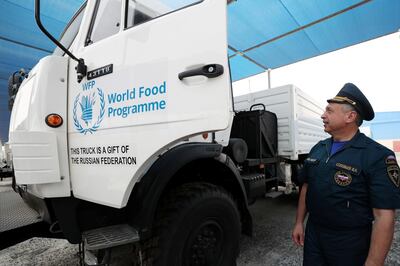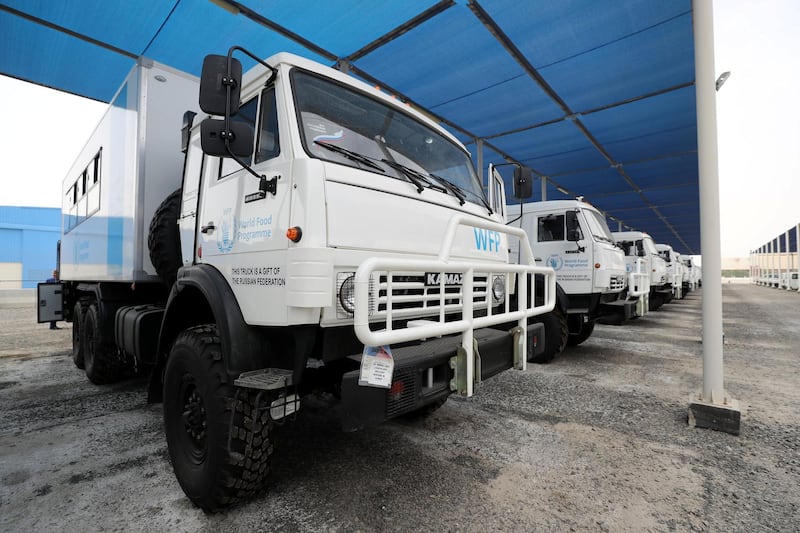A convoy of dozens of rugged Russian trucks have arrived in Dubai, ready to be deployed in the tough terrain of disaster zone and emergency situations across the globe.
A total of 97 Kamaz heavy goods vehicles and 30 trailers have been donated by the Russian Federation to the World Food Programme, to deliver life-saving humanitarian aid.
Of those, 37 are parked up at Dubai’s International Humanitarian City ready to be shipped out for duty, while 60 more are due to be delivered for use in crisis areas of Uganda and Ghana.
Mageed Yahia, UAE director of the World Food Programme, said the vehicles are a vital component of the United Nations aid programme.
“These trucks will be used wherever our operations are and the environment is tough, that could be anywhere in the world,” he said.
“Afghanistan, for example, relies entirely on these kind of trucks as the road networks are so poor.
“The rainy season in Uganda and Ghana can last for months, causing serious damage to roads and infrastructure.

“The WFP is the logistical arm of the UN, so we are not just delivering food, but all humanitarian aid.
“It is more economical, as areas difficult to reach sometimes rely on helicopters.
“This is a better way to deliver supplies.”
Russian-made Kamaz trucks are favoured by the nation’s military for their durability and reliability in all road conditions, and seen as the perfect vehicle to take on some of the most exposed and remote areas of the planet.
Testimony to the vehicle’s durability is its success in the tough, multi-terrain Dakar rally, an event won by Kamaz vehicles 15 times in the truck category.
On any given day, WFP operates an average of 5,000 commercially contracted trucks.
In challenging environments, where WFP’s needs exceed the capacities of commercial transporters, WFP relies on its own fleet of nearly 800 heavy-duty trucks designed to cope with the toughest road conditions.
Read More
[ UAE philanthropist: emergency response must change to save more lives ]
[ UN Population Fund faces funding shortfall in fight to help women and children in Middle East ]
The fleet fill critical gaps in transport capacity, carrying out deliveries in the most challenging WFP operations, mostly affected by war and natural disaster.
In 2012, the Russian Federation donated 40 Kamaz trucks to the WFP Afghanistan Country Office, which have been successfully integrated into daily operations.
A further 218 Kamaz vehicles were donated in 2015 to carry out food and aid missions in the Democratic Republic of Congo, South Sudan and Ethiopia.
Vladimir Solovyov, director of Russia’s International Affairs at the Ministry of Emergency Situations, said the UN partnership has developed over 25 years of co-operation.
“This work allows us to provide social and economic support to some the most difficult areas to access on the planet, particularly in Africa and Central Asia,” he said.
“Our joint co-operation will implement new programmes to help vulnerable groups, including women and children.”
Since the Kamaz trucks have been incorporated into the WFP global fleet, they have transported more than 350,000 metric tonnes of aid.
Much of that has travelled along the most demanding and complicated routes, covering more than 6.5 million kilometres.
It is a far more efficient method of delivery than air-drops, according to Yuri Vidakas, Charge D’Affairs of Russia in the UAE.
“Traditionally, Russia has been adept at producing trucks that are durable and perform in many different environments,” he said.
“These trucks have reinforced frames and can withstand many different environments.
“This project shows Russia is not just a politically minded nation, but also humanitarian.”







